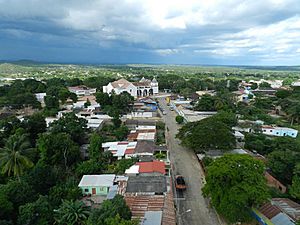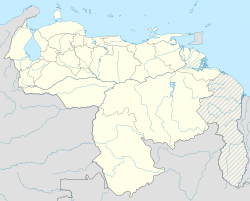Clarines facts for kids
Quick facts for kids
Clarines
|
|
|---|---|
 |
|
| Country | |
| State | Anzoátegui |
| Municipality | Manuel Ezequiel Bruzual Municipality |
| Founded | 1594 |
| Elevation | 8 m (26 ft) |
| Population
(2007)
|
|
| • Total | 15,000 |
| Time zone | UTC−4 (VET) |
| Climate | BSh |
Clarines is a town in Venezuela's Anzoátegui State. It is located on the right side of the Unare River. Clarines is the main town for the Manuel Ezequiel Bruzual Municipality. You can find it on Venezuela Route 11 and Route 9. Route 9 connects Clarines to Caracas in the west and Barcelona in the east. The town is about 80 kilometers (50 miles) from Puerto La Cruz. It is also 22 kilometers (14 miles) from Puerto Piritu. In 2007, about 15,000 people lived there.
History of Clarines
Clarines was officially started on April 7, 1594. A Spanish explorer named Francisco de Vides founded it. He came from a place called Huelva in Spain. Before he arrived, there was already a village of Palenques Indigenous people living there.
The town was named after "Our Lady of Los Clarines." This is the patron saint of Beas, a town in Spain. In 1650, Franciscan friars (religious brothers) came to Clarines. At that time, it was still mostly an Indigenous village. Clarines began to change a lot in the 1960s. This was when the oil industry started to grow in the area.
In 1852, Clarines had a population of 4,289 people. Most of these people (3,321) were Indigenous.
Some famous people were born in Clarines:
- Alfredo Armas Alfonzo (born 1921) was a Venezuelan historian and writer.
- Jaime Lusinchi (born 1924) was a former president of Venezuela.
Things to See in Clarines
The Museo de Clarines (Clarines Museum) is a cool place to visit. It has many items that show the town's history. You can even see a collection of old weapons there!
Clarines' Economy
Many people in Clarines practice subsistence farming. This means they grow food mainly for themselves and their families. They grow crops like plantains, yuca (cassava), beans, cotton, and corn.
A long time ago, before oil was discovered, the town's main exports were cattle and mules. Today, many small businesses in Clarines help support the oil fields nearby.
See also
 In Spanish: Clarines para niños
In Spanish: Clarines para niños
 | Valerie Thomas |
 | Frederick McKinley Jones |
 | George Edward Alcorn Jr. |
 | Thomas Mensah |


